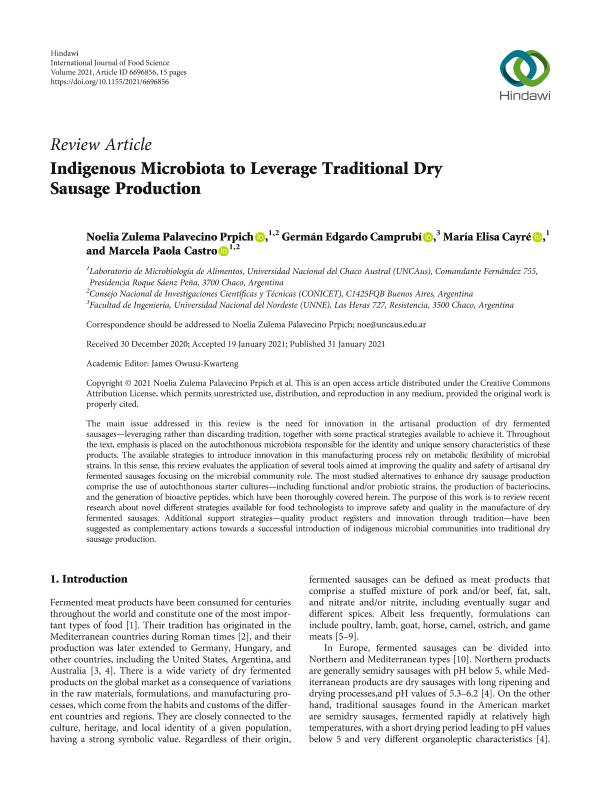Mostrar el registro sencillo del ítem
dc.contributor.author
Palavecino Prpich, Noelia Zulema

dc.contributor.author
Camprubí, Germán Edgardo

dc.contributor.author
Cayré, María Elisa
dc.contributor.author
Castro, Marcela Paola

dc.date.available
2021-08-13T15:22:43Z
dc.date.issued
2021-03
dc.identifier.citation
Palavecino Prpich, Noelia Zulema; Camprubí, Germán Edgardo; Cayré, María Elisa; Castro, Marcela Paola; Indigenous microbiota to leverage traditional dry sausage production; Hindawi Publishing Corporation; International Journal of Food Science; 2021; 3-2021; 1-15
dc.identifier.issn
2356-7015
dc.identifier.uri
http://hdl.handle.net/11336/138279
dc.description.abstract
The main issue addressed in this review is the need for innovation in the artisanal production of dry fermented sausages-leveraging rather than discarding tradition, together with some practical strategies available to achieve it. Throughout the text, emphasis is placed on the autochthonous microbiota responsible for the identity and unique sensory characteristics of these products. The available strategies to introduce innovation in this manufacturing process rely on metabolic flexibility of microbial strains. In this sense, this review evaluates the application of several tools aimed at improving the quality and safety of artisanal dry fermented sausages focusing on the microbial community role. The most studied alternatives to enhance dry sausage production comprise the use of autochthonous starter cultures-including functional and/or probiotic strains, the production of bacteriocins, and the generation of bioactive peptides, which have been thoroughly covered herein. The purpose of this work is to review recent research about novel different strategies available for food technologists to improve safety and quality in the manufacture of dry fermented sausages. Additional support strategies-quality product registers and innovation through tradition-have been suggested as complementary actions towards a successful introduction of indigenous microbial communities into traditional dry sausage production.
dc.format
application/pdf
dc.language.iso
eng
dc.publisher
Hindawi Publishing Corporation

dc.rights
info:eu-repo/semantics/openAccess
dc.rights.uri
https://creativecommons.org/licenses/by-nc-sa/2.5/ar/
dc.subject
DRY SAUSAGES
dc.subject
INNOVATION THROUGH TRADITION
dc.subject
LACTIC ACID BACTERIA
dc.subject
STAPHYLOCOCCI
dc.subject.classification
Alimentos y Bebidas

dc.subject.classification
Otras Ingenierías y Tecnologías

dc.subject.classification
INGENIERÍAS Y TECNOLOGÍAS

dc.title
Indigenous microbiota to leverage traditional dry sausage production
dc.type
info:eu-repo/semantics/article
dc.type
info:ar-repo/semantics/artículo
dc.type
info:eu-repo/semantics/publishedVersion
dc.date.updated
2021-07-30T18:52:40Z
dc.identifier.eissn
2314-5765
dc.journal.volume
2021
dc.journal.pagination
1-15
dc.journal.pais
Egipto

dc.description.fil
Fil: Palavecino Prpich, Noelia Zulema. Universidad Nacional del Chaco Austral; Argentina. Consejo Nacional de Investigaciones Científicas y Técnicas. Centro Científico Tecnológico Conicet - Nordeste; Argentina
dc.description.fil
Fil: Camprubí, Germán Edgardo. Universidad Nacional del Nordeste; Argentina
dc.description.fil
Fil: Cayré, María Elisa. Universidad Nacional del Chaco Austral; Argentina
dc.description.fil
Fil: Castro, Marcela Paola. Consejo Nacional de Investigaciones Científicas y Técnicas. Centro Científico Tecnológico Conicet - Nordeste; Argentina. Universidad Nacional del Chaco Austral; Argentina
dc.journal.title
International Journal of Food Science
dc.relation.alternativeid
info:eu-repo/semantics/altIdentifier/url/https://www.hindawi.com/journals/ijfs/2021/6696856/
dc.relation.alternativeid
info:eu-repo/semantics/altIdentifier/doi/http://dx.doi.org/10.1155/2021/6696856
Archivos asociados
